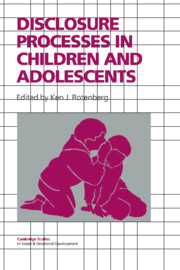Book contents
- Frontmatter
- Contents
- List of contributors
- 1 Disclosure process: an introduction
- 2 Patterns and functions of self-disclosure during childhood and adolescence
- 3 Intimacy and self-disclosure in friendships
- 4 Self-disclosure and the sibling relationship: what did Romulus tell Remus?
- 5 Lonely preadolescents' disclosure to familiar peers and related social perceptions
- 6 Children's disclosure of vicariously induced emotions
- 7 Moral development and children' differential disclosure to adults versus peers
- 8 Parential influences on children's willingness to disclose
- 9 Disclosure processes: issues for child sexual abuse victims
- 10 Self-disclosure in adolescents: a family systems perspective
- Author index
- Subject index
8 - Parential influences on children's willingness to disclose
Published online by Cambridge University Press: 29 August 2009
- Frontmatter
- Contents
- List of contributors
- 1 Disclosure process: an introduction
- 2 Patterns and functions of self-disclosure during childhood and adolescence
- 3 Intimacy and self-disclosure in friendships
- 4 Self-disclosure and the sibling relationship: what did Romulus tell Remus?
- 5 Lonely preadolescents' disclosure to familiar peers and related social perceptions
- 6 Children's disclosure of vicariously induced emotions
- 7 Moral development and children' differential disclosure to adults versus peers
- 8 Parential influences on children's willingness to disclose
- 9 Disclosure processes: issues for child sexual abuse victims
- 10 Self-disclosure in adolescents: a family systems perspective
- Author index
- Subject index
Summary
Victimization during childhood is unfortunately not an uncommon event. Children become prey both to family members and to strangers, and to some extent the long-term damage resulting from either sexual or physical abuse appears to be mediated by the feelings of betrayal engendered by the abuse. Abuse by a close family member is the ultimate betrayal and places the child most at risk for keeping the acts a secret (Freyd, 1991). Children who feel they have no one to tell or who are not believed show longerterm, more serious reactions. In their review of the impact of child sex abuse, Browne and Finkelhor (1986) report that the more severely disturbed children had parents who reacted negatively to the children's attempts to disclose. A child's ability to disclose intimate information to a parent is embedded in the larger context of the child's willingness to communicate information about his or her life to the parent. In turn, the ability of the parent to keep communication lines open and to gather information is an important family management skill. But there is suprisingly little research on how parental behaviors affect children's communication.
Communication has been studied mostly in the realm of cognitive development, and the study of the development of cognitive capabilities has been concerned with the origins of intellectual functioning. For many theorists, notably Piaget, cognitive processes emerge in response to pressing internal demands to make sense of the world that surrounds us.
- Type
- Chapter
- Information
- Disclosure Processes in Children and Adolescents , pp. 148 - 165Publisher: Cambridge University PressPrint publication year: 1995
- 3
- Cited by

